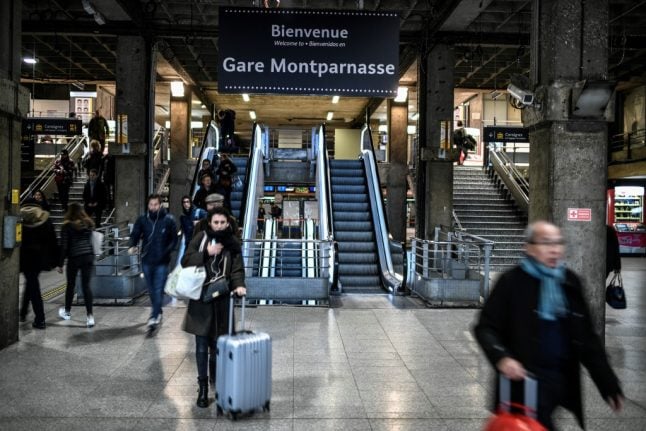French unions have called for two more national days or protests and strikes against the government's pension reforms on Thursday January 9th and Saturday January 11th.
But the ongoing rolling transport strikes – the longest in French history, continue to cause travel misery albeit the situation is improving day by day.
While services are far from returning to normal this weekend should see a clear improvement on the rails and Metro services in Paris.
Seventy percent of the TGV InOui trains and the low-cost OuiGo high-speed services will be running on Saturday, rail operator SNCF announced Friday afternoon.
One third of Intercité mainline trains will be in service along with around half of the regional TER trains. In the Paris region one out of five Transilien services will be operating.
? CIRCULATION DES TRAINS le 4 janvier ?
? Retrouvez l’info en temps-réel la veille dès 17h sur l’#AssistantSNCF ? https://t.co/eiZMVDEquX pic.twitter.com/Fb5W68bvxT— SNCF (@SNCF) January 3, 2020
The SNCF said it expected a “strong improvement” of the traffic situation next week.
The amount of SNCF workers on strike has been falling steadily since the beginning of the strike. On Friday January 5th the number was the lowest since the strikes began on December 5th.
Thirty-one percent of train drivers were on strike on Friday, compared to over 70 percent in the earlier days of the movement.
International services including Eurostar, Thalys and Lyria trains will also be disrupted over the weekend due to the strikes.
In Paris the Metro services are set to improve over the weekend with some 14 out of 16 lines operating normal or reduced services on Saturday.
Transport authority RATP say a minimum service will be guaranteed on most lines (3, 4, 6, 7, 8, 10 and 12) from 1pm until 6pm on Saturday.
Lines 2, 11 and 12 will run on limited service from 8am until 12pm, while line 5 and 9 will run on limited services from 8am and 10pm respectively and until 6pm.
Mouvement Social : le 4/01 le trafic sera très perturbé,les déplacements domicile-travail étant moins nombreux le week-end, la RATP concentrera le maximum de ses efforts l’après-midi pour garantir un service minimum : 13h-18h pour le métro,8h-18h30 sur le RER A & 8h-20h sur la B pic.twitter.com/mXb5VdRqJF
— RATP Group (@RATPgroup) January 3, 2020
The only automated lines (1 and 14) will run a normal service all day.
3bis and 7bis are the only lines that will not run at all.
Airport bus services OrlyVal and RoissyBus will run as normal on Saturday, and so will the city's tram service.
Bus services will be reduced to an average of three out of four.
The RER lines, which connects Paris with its suburbs, will run on reduced services, half of the RER A trains operating between 8am and 6.30pm and one out of three RER B trains running from 8am and 8pm.
For Sunday RATP says services on the Metro and RER will be similar to Saturday.
The standoff over the government's plan to merge 42 pension schemes into a single, points-based system has seen workers at the state-owned SNCF railway company and Paris' RATP public transport operator down tools since December 5th.
On Friday, unions published a press release calling for another day of mobilisation on January 9th, just two days after the already planned national strike action on January 7th, when the government and unions are to resume talks.
L’ intersyndical nationale appelle à donner des suites à la grève du 9 janvier dès le 10 et à organiser partout des manifestations samedi 11!
La généralisation de la grève est cruciale pour la semaine à venir dans tous les secteursEnsemble, par la grève on va gagner ! ✊ pic.twitter.com/IQv5NESuP6
— UNL 06 (@unl_nice) January 3, 2020
“To win, we have to broaden and amplify the movement in all professional sectors starting January 9th,” the statement said.
Hundreds of thousands of strikers and their supporters have turned out for three mass rallies in recent weeks. Rail workers were joined by teachers, hospital workers and other public-sector employees angry about the overhaul, which they fear will leave pensioners poorer.
The previous longest SNCF strike, over salary and working conditions, lasted for 28 days in 1986 and early 1987.
The latest action has crippled public transport, particularly in Paris and its outskirts, and severely disrupted regional and long-distance trains, with thousands having to cancel or modify their plans for the year-end holidays.
But the strikes have also been hard on the workers, who forfeit their salaries during strikes. A pressing question is how long unions can keep their members motivated enough to continue the strike action.
READ ALSO: Strikes in France – The crucial dates that will determine what happens next



 Please whitelist us to continue reading.
Please whitelist us to continue reading.
Member comments